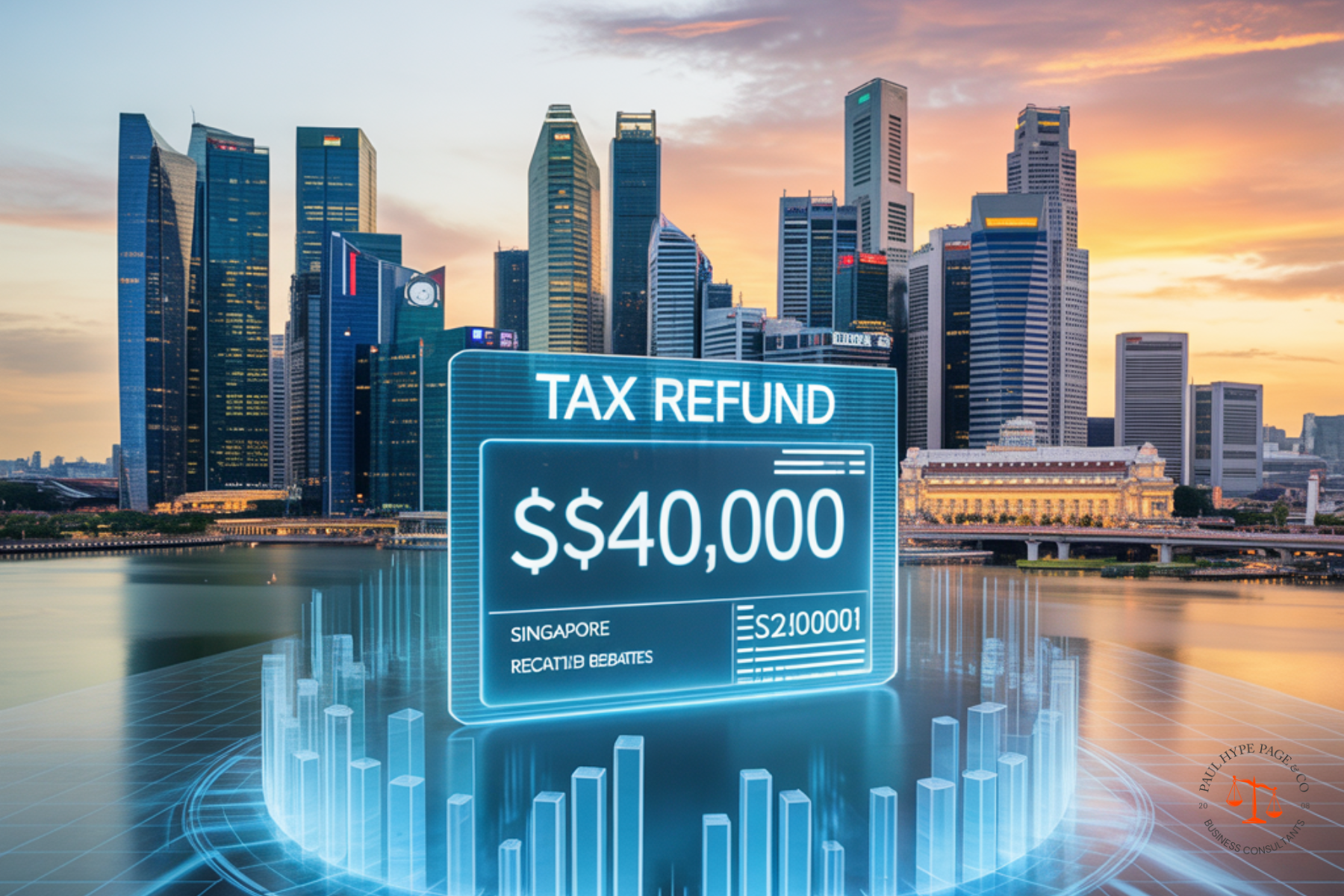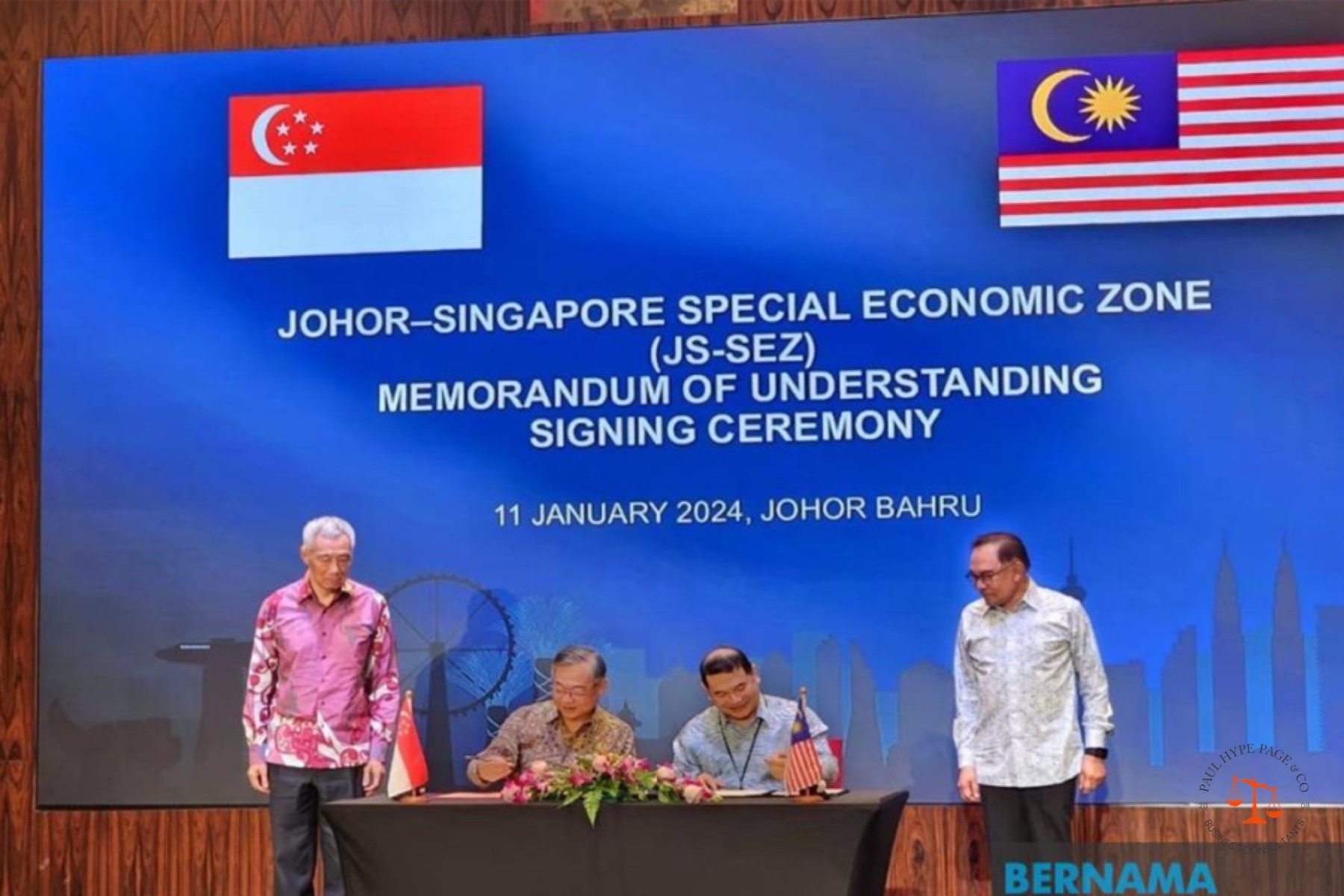Outline
- What Are the YA 2025 Corporate Tax Benefits and How Do They Work?
- What Is the 50% Corporate Income Tax Rebate and Why Is It Important?
- What Is the S$2,000 Cash Grant and Who Qualifies?
- Why Did Singapore Introduce the S$40,000 Tax Support Package?
- How Can Companies Maximise the Full S$40,000 Support?
- Real Examples: How Different Companies Benefit
- Why Companies Choose Paul Hype Page to Maximise Their Tax Savings
- Claim Your S$40,000 Benefit with Expert Guidance
- 🚀 Claim Your S$40,000 Benefit with Expert Guidance
- FAQs

Singapore has long positioned itself as a business-friendly economy, but Budget 2025 introduces one of the most significant financial incentives for companies in recent years: a combined Corporate Income Tax (CIT) Rebate and Cash Grant worth up to S$40,000. This incentive is designed to help businesses strengthen their cash flow, manage rising operating costs, support local hiring, and reinvest in growth amid an increasingly competitive global landscape.
For startups, SMEs, and foreign-owned entities operating in Singapore, understanding these incentives is not just informative — it is financially strategic. Companies that plan their 2024 financials correctly, remain compliant, and optimise for these benefits can enjoy meaningful tax savings, direct cash support, and an enhanced financial position entering 2025 and beyond. This guide breaks down exactly how the tax rebate works, who qualifies for the S$2,000 cash grant, and how your company can claim the maximum S$40,000 benefit.
What Are the YA 2025 Corporate Tax Benefits and How Do They Work?
Singapore’s tax support for YA 2025 is structured around two core components that work together to reduce your tax burden and support local employment. Unlike many business grants that require complex applications, these mechanisms are credit-based and processed automatically by IRAS once your YA 2025 filings are submitted.
Singapore’s YA 2025 Tax Benefits Include:
- A 50% Corporate Income Tax Rebate, capped at S$40,000
- A S$2,000 CIT Rebate Cash Grant for companies hiring at least one local employee in 2024
- Automatic disbursement (no application required)
- Benefits available to both local and foreign-owned companies
These benefits are intentionally designed to be simple, broad-based, and supportive of active businesses contributing to the Singapore economy.
What Is the 50% Corporate Income Tax Rebate and Why Is It Important?
The 50% Corporate Income Tax Rebate is the foundation of the S$40,000 support package and applies to all companies with tax payable in YA 2025. Under this mechanism, IRAS automatically reduces your tax payable by half — up to a maximum rebate of S$40,000.
This rebate is especially impactful for SMEs and high-growth companies. A company with S$30,000 in tax payable receives a S$15,000 rebate, while a company with S$80,000 or more in tax payable receives the maximum S$40,000. This immediate reduction in tax outflow significantly improves working capital and allows businesses to redirect funds toward hiring, expansion, automation, or simply stabilising cash reserves during uncertain economic periods.
More importantly, the rebate functions as a built-in support mechanism. Companies do not need to file separate forms or navigate complicated conditions — as long as they file their tax returns for YA 2025, IRAS automatically assesses and applies the rebate. This frictionless design reflects Singapore’s commitment to supporting business viability without overwhelming companies with administrative burdens.
Why the Rebate Matters for Companies:
- Strengthens cash flow and working capital
- Reduces overall tax burden across all industries
- Benefits both mature companies and fast-scaling businesses
- Requires no additional application — fully automated
- Supports long-term investments and reinvestment into operations
What Is the S$2,000 Cash Grant and Who Qualifies?
Beyond the tax rebate, Singapore offers an additional S$2,000 cash payout for companies that contributed to local employment in 2024. This initiative ensures that even companies with low taxable income or those still in the early stages of development receive meaningful support.
The S$2,000 CIT Rebate Cash Grant is automatically disbursed once IRAS verifies that your company meets two key criteria. First, your business must be active, meaning it must have engaged in commercial activities or operations during the period. Dormant companies, entities with no revenue movement, or companies in liquidation are excluded. Second, your company must have hired at least one Singaporean or Singapore Permanent Resident employee during the 2024 calendar year, with CPF contributions made accordingly. Critically, shareholder-directors do not qualify as the “local employee” for this scheme, which means new companies need to structure manpower roles carefully if they wish to access the cash payout.
When both conditions are met, IRAS releases the S$2,000 grant without requiring any action from the company. This makes the grant especially valuable for early-stage companies, startups, and foreign businesses that entered Singapore in 2024, as it provides an immediate cash boost even if the company made little or no profit in the financial year.
What the Cash Grant Means for Businesses:
- Startups with low profits still receive tangible support
- Early-stage companies gain meaningful cash flow
- SMEs offset part of their manpower costs
- Hiring decisions become strategically valuable
- No application needed — IRAS disburses automatically
Why Did Singapore Introduce the S$40,000 Tax Support Package?
Singapore’s 2025 tax support package reflects a broader economic strategy to reinforce competitiveness and support businesses amid rising costs. Companies across various sectors have experienced increased rental pressures, wage inflation, higher compliance costs, and supply chain volatility. The S$40,000 support scheme is designed to counterbalance these challenges and maintain Singapore’s attractiveness for startups, foreign investors, SMEs, and high-growth enterprises.
At the same time, the government aims to encourage continued investment in local employment. By tying the S$2,000 cash grant to CPF contributions, the policy ensures that economic activity translates into local workforce participation. This helps stabilise the labour market and supports employers who contribute directly to Singapore’s economic fabric.
Budget 2025 also reflects Singapore’s long-term commitment to fostering innovation, productivity, and transformation. The tax savings companies unlock through this scheme can be channelled into digitalisation, automation, technology upgrades, regional expansion, or capability building. By alleviating immediate financial pressures, the government is empowering companies to reinvest and accelerate their growth trajectory.
Why This Incentive Is Strategically Important:
- Helps companies cope with rising business costs
- Strengthens the employment landscape through local hiring
- Encourages reinvestment into digital transformation and efficiency
- Supports SMEs navigating economic uncertainty
- Reinforces Singapore’s global competitiveness
How Can Companies Maximise the Full S$40,000 Support?
Maximising the S$40,000 benefit requires both operational and financial planning. Many companies automatically benefit from the tax rebate because their profits translate into sufficient tax payable. However, companies with moderate profits or those newly set up in 2024 may need more deliberate planning to secure the maximum support.
One strategic approach is to look carefully at how your company recognises revenue and deducts expenses in FY 2024. Because the rebate applies to corporate tax payable, optimising chargeable income can materially affect your rebate. Companies may choose to defer or advance certain deductions, adjust capital allowance timing, or restructure expense categories to ensure an optimal rebate outcome — all within legal and tax-compliant boundaries. Early tax planning rather than year-end scrambling is key to capturing these benefits.
Equally important is hiring. Companies with minimal tax payable may still unlock the S$2,000 cash grant simply by hiring one local employee in 2024. Many startups overlook this because founders often act as shareholder-directors, which does not qualify. Hiring even a part-time local administrator, marketer, or operations assistant can open the door to the grant. Additionally, companies must remain active, maintain a clean compliance track record, and file their ECI and Form C-S or C on time to avoid missing out on disbursement.
Key Strategies to Maximise the S$40,000
- Conduct early tax planning for FY 2024
- Optimise timing of revenue recognition and allowable deductions
- Ensure proper classification of business expenses
- Hire at least one local employee to unlock the grant
- Maintain active status and compliance with IRAS & ACRA
- Use professional advisory to avoid costly missteps
Real Examples: How Different Companies Benefit
Real-world scenarios make it clear how diverse businesses gain from the S$40,000 support package — regardless of industry, size, or stage of growth.
Example 1: High-Growth SME with Strong FY 2024 Performance
A logistics company recorded robust profits, resulting in S$80,000 in corporate tax payable for YA 2025. Under the 50% tax rebate, it received the full S$40,000 support. This immediately strengthened its working capital, allowing the company to reinvest in vehicle upgrades, digital tracking systems, and additional staff without dipping into reserves. Because the company reached the cap through the rebate alone, it did not receive the S$2,000 grant.
Example 2: Newly Incorporated Startup with Low Profitability
A startup launched in 2024 focused on building its product and customer acquisition. With modest revenue and high development costs, its tax payable was just S$3,000, making it eligible for only a S$1,500 rebate. However, because it hired a Singaporean administrative assistant in 2024, it qualified instead for the S$2,000 cash grant, giving it more support than the rebate would have provided. This cash was crucial for funding operational expenses during a high-growth but low-revenue phase.
Example 3: Retail Business Navigating Rising Costs
A boutique retailer with S$20,000 in tax payable received a S$10,000 rebate under the scheme. With rent and manpower costs rising in 2025, this rebate allowed the retailer to maintain sufficient inventory levels, refresh merchandising strategy, and invest in offline-to-online sales tools to remain competitive.
Example 4: Foreign-Owned Holding Company Entering Singapore
A foreign company established a Singapore entity to oversee Southeast Asia operations. It generated income through consulting and management fees, resulting in tax payable and a mid-tier rebate. However, because it did not hire any local employees in 2024, it missed out on the S$2,000 cash grant. With proper advisory, the company could have restructured its manpower or hired a part-time local staff to unlock additional benefits.
These examples show that every company benefits, but planning determines the scale of the savings.
Why Companies Choose Paul Hype Page to Maximise Their Tax Savings
Paul Hype Page & Co. assists thousands of businesses across Singapore with tax planning, accounting, incorporation, and compliance. Our team ensures your company:
- maximises your YA 2025 rebate
- qualifies correctly for the S$2,000 grant
- avoids compliance errors that may reduce eligibility
- files accurate ECI, Form C-S, and financial statements
- plans financials strategically to optimise tax payable
With deep experience across diverse industries and regional operations, PHP ensures companies never leave government incentives unclaimed.
Claim Your S$40,000 Benefit with Expert Guidance
The YA 2025 tax support package is a rare opportunity for companies in Singapore to improve cash flow, reinvest confidently, and strengthen financial resilience. Whether you are a new startup, an expanding SME, or a foreign-owned entity, structured planning can help you receive maximum benefits.
Start your journey with Paul Hype Page — your trusted incorporation, accounting, and tax advisory partner in Singapore.
FAQs
No. Shareholder-directors are specifically excluded from the local employee requirement. Only non-shareholding Singaporean or PR employees with CPF contributions count toward the grant.
An active company is one that carried out business operations, generated transactions, or had commercial activity during the financial year. Dormant companies, those with no operations, or those in liquidation will not qualify for the S$2,000 grant.
Yes. As long as your company was active and hired at least one local employee (Singaporean or PR) with CPF contributions in 2024, you will receive the S$2,000 cash grant even if your chargeable income is zero.
No. The S$2,000 cash grant is part of the total benefit. The rebate plus the cash grant cannot exceed S$40,000. If your rebate exceeds S$2,000, you receive only the rebate; if your rebate is below S$2,000, the grant replaces it.
Your company qualifies for the full S$40,000 if your corporate tax payable is high enough that the 50% Corporate Income Tax Rebate reaches the maximum rebate cap. Companies with at least S$80,000 in tax payable will hit the full S$40,000 rebate. Ensuring proper tax planning, accurate revenue reporting, and timely filings helps you maximise the benefit.
Share This Story, Choose Your Platform!
Related Business Articles







